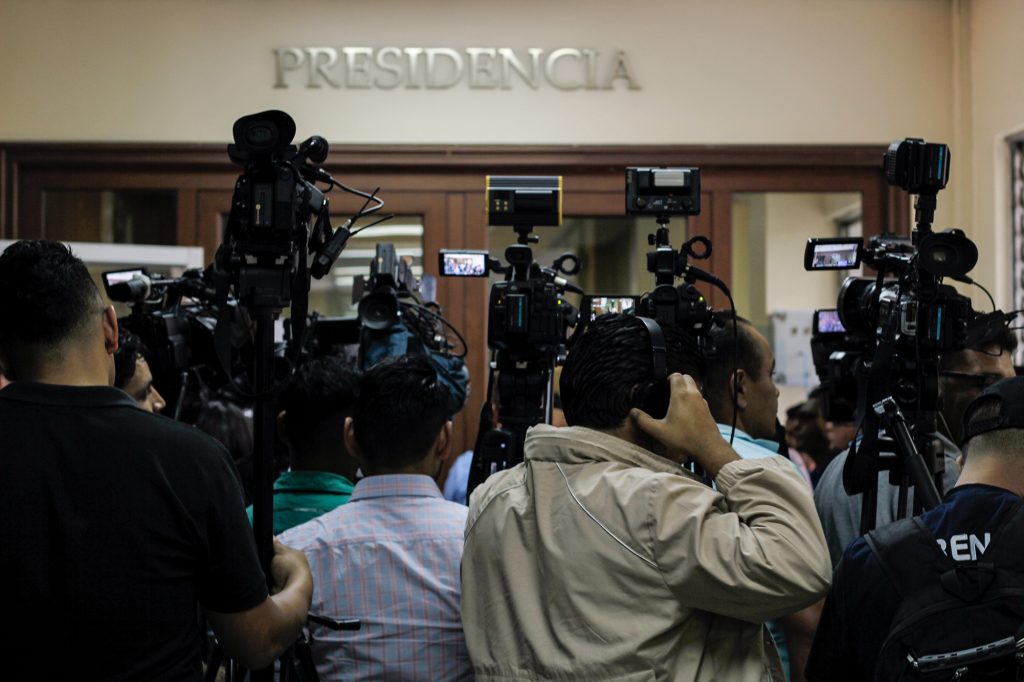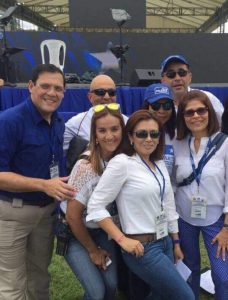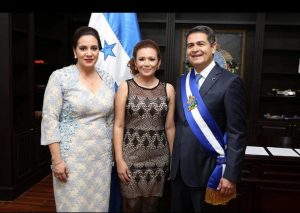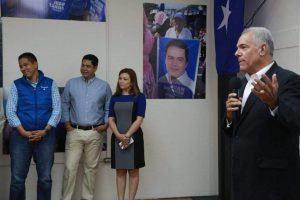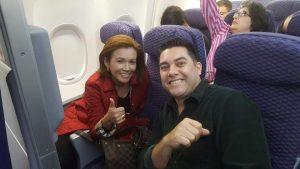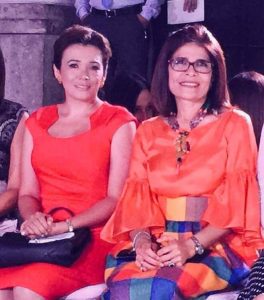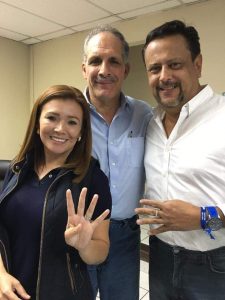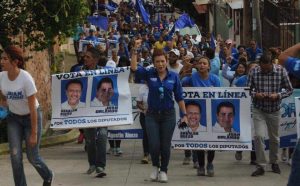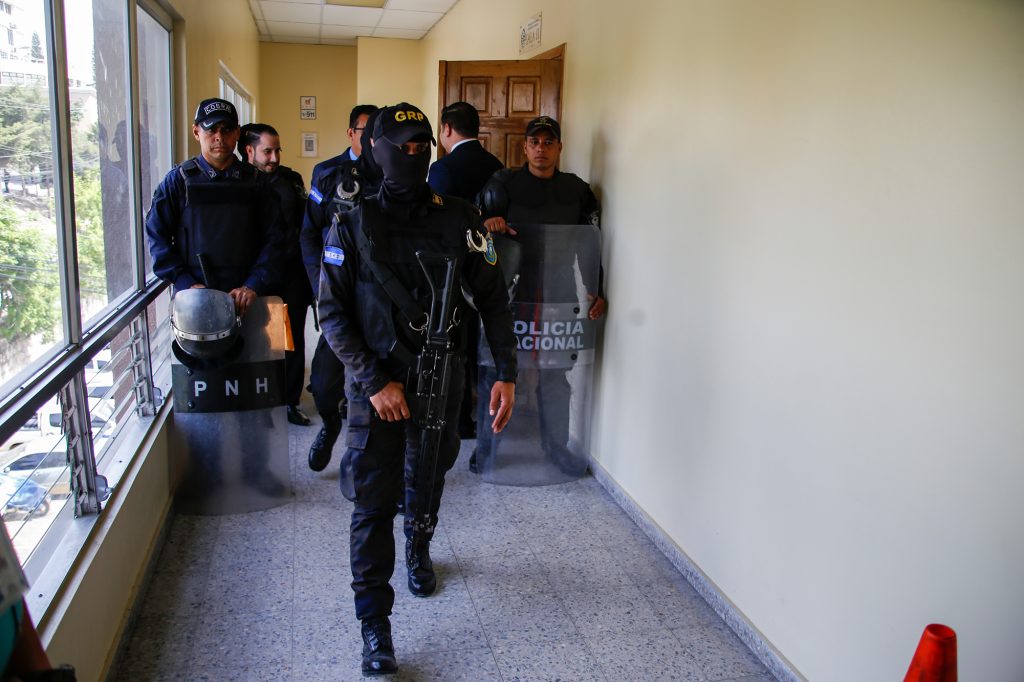The Hermes case filed by UFERCO, the Ministry of Justice’s anti-corruption unit, is the last piece of a puzzle that now provides a complete picture of how Juan Orlando Hernández rose to power through political patronage and media control. The indictment charges Hilda Hernández, the deceased minister and sister of the president, with leading a corruption ring that embezzled more than 122 million lempiras (US$5 million) in public funds.
By Fernando Silva
Photos by Martín Cálix
In 2015, when CNN journalist Fernando del Rincón asked President Juan Orlando Hernández whether he was violating the Honduran constitution by appointing his sister, Hilda Hernández Alvarado, to a ministerial position, the president replied that although she worked in the Ministry of Communications and Strategy, she “does not manage a budget or other portfolio” and therefore “she is not considered to be a government minister.”
Two years later, protests about electoral fraud and the illegal reelection of the president were at a fever pitch when news broke of Hilda Hernández’s death in a helicopter crash. Now, months before Orlando Hernández’s term comes to an end, her name is in the spotlight once again following an indictment by UFERCO (Unidad Fiscal Especializada Contra la Corrupción), the Ministry of Justice’s anti-corruption unit. UFERCO names Hernández as the person who in 2013, created a shell company called Servicios e Inversiones AID, through which more than 122 million lempiras (US$5 million) from the Office of the President was funneled to pay off more than 70 journalists, buy airline tickets, transport pro-government activists to government events, rent armored vehicles, and gain other personal benefits.
The UFERCO investigation alleges that journalists received millions of dollars for “writing favorable news articles about President Juan Hernández, brother of Hilda Hernández, Minister of Communication and Strategy, without disclosing any connections between the journalists and the presidency.” Dubbed the “Hermes” case by UFERCO, the indictment alleges that Hilda Hernández directed Carol Vanessa Alvarado, her friend and assistant, to create a shell company and funnel government funds through that entity to pay for various efforts benefitting her brother’s political campaign and to influence a pro-government narrative in the media. Hermes is the continuation of Pandora and Corruption on Wheels, two investigations initiated earlier by MACCIH (Misión de Apoyo contra la Corrupción y la Impunidad), the now defunct anti-corruption commission.
***
Carol Vanessa Alvarado has always stayed close to National Party leaders and power brokers. Between 2010 and 2013, she was deputy budget manager at the Ministry of Development and Social Inclusion (Ministerio de Desarrollo e Inclusión Social – SEDIS), and then became an administrative manager for the Office of the President for three months in early 2014. Following that assignment, she returned to SEDIS and later ran for public office as an alternate congressional representative in 2017 when Juan Orlando Hernández won reelection.
Carol was always close to Hilda Hernández. According to the UFERCO indictment, in 2013, the president’s sister ordered Alvarado to register José Adolfo Sierra, Alvarado’s personal driver, as an authorized representative of Servicios e Inversiones AID. Soon after, the company opened an office in Tegucigalpa’s La Granja neighborhood, as well as a checking account with Banco Atlantida. When Hilda Hernández was appointed Minister of Communication and Strategy, they closed that office and moved to an office within the Office of the President, and operated from there until 2016.
The charges presented in the Corruption on Wheels case indicate that Hilda Hernández’s name was not associated with Servicios e Inversiones AID because she said that she was not allowed to create private companies as a public official, and because she did not want any adverse publicity for herself or her brother’s presidential campaign. However, while working at the Office of the President between April 9, 2014 and December 8, 2016, she signed 53 checks amounting to 122 million lempiras (US$5 million) paid to various radio and television media outlets for advertising and publicity services.
UFERCO’s investigation found that 14 of the 53 payments were not backed by any type of service contract. Most of this money was used to pay for advertising for government initiatives such as the Honduras Actívate and Navidad Catracha programs. The indictment also notes that none of these contracts were awarded through a competitive bidding process, despite regulations requiring such a process for contracts above a certain amount. In addition, the payments made by the Office of the President to Servicios e Inversiones AID exceeded the 2014, 2015 and 2016 budgets for this type of expenditure by more than 49 million lempiras (US$2 million).
According to the indictment, Hernández made verbal agreements with more than 70 journalists to write news and opinion pieces favorable to the president. At least 60 million lempiras (US$2.47 million) were funneled through the shell company to pay some of the country’s most prominent journalists for this service.
In June 2015, the indignados (outraged) movement protested to demand accountability for the massive embezzlement of the Honduran Institute of Social Security (IHSS). Amid widespread calls for an international commission to investigate impunity in Honduras (Comisión Internacional Contra La Impunidad en Honduras – CICIH), a group of high-profile journalists met with Hilda Hernández to initiate a national dialogue and quell the protests. Two of the journalists in that meeting were Luis Edgardo Vallejo, who received 2.6 million lempiras (US$107,000) over a two-year period, and Armando Villanueva, who received 480,000 lempiras (US$19,800).
These back-room deals with journalists didn’t seem to have any expiration date. In 2018, President Hernández gave a series of exclusive interviews to several journalists, including Rosendo Garcia. In his interview with Garcia about the federal charges against his brother, Juan Antonio Hernández, who is being tried in the Southern District of New York, the president said, “This is a complicated case because the witnesses are people who have been heavily affected by decisions I have made as president and when I was president of the National Congress.”
Rosendo García is director of the Al Banquillo news analysis program broadcast by Televicentro, one of the largest media companies in the country. In 2018, Garcia gave an interview to a national newspaper in which he expressed his opinion about journalists who take money from the government. “It’s a bad idea to have journalists sell advertising for their own programs. A journalist doesn’t actually go around selling advertising to politicians or businesses. But some politicians give money to journalists without entering into advertising contracts. I’m glad it hasn’t happened to me. I don’t see this as a politician giving you a gift as a payoff for something. But there’s still a sense of obligation attached to the money.”
Between April 14, 2014 and October 27, 2016, Garcia received monthly payments of 60,000 lempiras amounting to 1.9 million lempiras (US$79,000) from Servicios e Inversiones AID. In 2017, the National Congress awarded him a journalism prize.
Another journalist who received government money was Ernesto Alonso Rojas, who works for the HCH (Hable Como Habla) TV channel. In December 2018, Rojas was interviewing people at the Metropolitan Bus Terminal in San Pedro Sula who were chanting disparaging slogans about the president. Rojas said “He [the president] isn’t going anywhere. Stop chanting that stuff – it’s so annoying.” Later on he said, “They’re all idiots, just idiots.” Rojas was paid 360,000 lempiras (US$15,000) between June 2015 and October 2016 through Servicios e Inversiones AID.
Even before the details of the UFERCO investigation were revealed, reports surfaced about government practices that could be seen as attempts to influence the press. Contracorriente reported in 2019 that the government paid the travel expenses of journalists who flew to Israel to cover the opening of the Honduran Trade and Cooperation Office in Jerusalem.
The Office of the President paid the airfare, transportation and meals for journalists, according to one journalist who covered the event in Israel. Economy class airfare from Honduras to Israel costs about 46,000 lempiras (US$1,900), so the government spent approximately 465,000 lempiras (US$19,000) on flights alone. This contradicts information provided by the Office of the President’s public information official.
Read our report (in Spanish): The Office of the President pays expenses for journalists who traveled to Israel
In response to the UFERCO investigation, the Honduran Association of Journalists issued a statement in which it claimed to have no information about the journalists identified in the indictment, and while it supports the battle against corruption, it doubted “… that [the payments] were used in an immoral or sinister manner to create hatred, produce smokescreens, or win pyrrhic political victories just to conduct a public lynching of our colleagues.”
None of the journalists identified in the indictment have been charged with a crime yet and there is no clarity about where the funds paid ultimately ended up. In addition, the person who received the most money from the Office of the President’s advertising fund was driver José Adolfo Sierra, who cashed 102 checks totalling 42.5 million lempiras (US$1.76 million). According to the indictment issued by the Office of the Public Prosecutor, these funds “…were delivered to his employer, Carol Vanessa Alvarado Izaguirre, or to other people working for her.”
UFERCO chief Luis Javier Santos has said that 11 public officials have been named in the indictment and that the charges against them should lead to arrest warrants that have not yet been issued by the Supreme Court of Justice.
The officials from the Office of the President charged in the indictment are: Pedro Alexander Pineda Díaz (Secretary of State for Financial Management), Harvis Edulfo Herrera Carballo (administrative manager), Lesly Mirella Fúnez Sierra (general accountant), and Axel Eduardo Huete González (administrative manager). They are charged with violation of the duties of public officials, embezzlement of public funds and fraud. Carol Vanessa Alvarado Izaguirre, Claudia Yamilia Noriega González and Normal Guillermo Noriega Rodríguez have also been charged with money laundering.
The indictment includes charges of aggravated obstruction against Mario Alberto Villanueva Menjívar, Deputy Chief of Budget Audits for the Superior Audit Court, as well as Gloria Margarita Vargas, Judit Mariel Muñoz Casteñada and Julio Antonio Galdámes Fuentes.
According to the Ministry of Justice, there is no evidence that José Adolfo Sierra made personal use of these funds, nor did he have access to checking accounts or credit cards belonging to Servicios e Inversiones AID. This could explain why there are no charges against him in the Corruption on Wheels and Hermes cases; the charges against him in the Pandora case were ultimately dismissed.
The Hermes indictment describes how these criminal acts were enabled by the collusion between “Carol Vanessa Alvarado, de facto administrator of Servicios e Inversiones AID, and a number of officials from the Office of the President.” These officials include Pedro Pineda, who faces 43 charges of violation of the duties of public officials, one charge of embezzlement of public funds, 43 charges of fraud, and 53 charges of embezzlement of public funds to the detriment of the public administration.
The role of Servicios e Inversiones AID in this case was very similar to its role in past public corruption cases. According to the Corruption on Wheels indictment, 26 checks amounting to four million lempiras (US$166,000) were issued from a government bank (Banco Nacional de Desarrollo Agrícola – BANADESA) to Servicios e Inversiones AID. More than two million lempiras came out of the National Party Campaign Committee’s account, and 667,000 lempiras came out of the Todos Somos Honduras foundation’s (also involved in the Pandora case) account. The remainder came from accounts belonging to other non-governmental organizations or private individuals.
The new indictment states that the National Congress issued three checks to Servicios e Inversiones AID totalling 760,000 lempiras (US$31,500) for “institutional advertising and publicity, television spots, and coverage of a National Congress special event” in 2013. However, according to the indictment, a competitive bidding process was required because the amount exceeded the 470,000 lempira (US$19,500) threshold.
The Office of the President also paid 862,000 lempiras (US$35,800) for 7,500 sandwiches on January 27, 2014, for the celebration of Juan Orlando Hernández’s first inauguration. Carol Vanessa Alvarado approved this payment while acting as the interim financial manager for the Office of the President, even though her appointment to this position had not been approved and while she still functioned as deputy budget manager for SEDIS. Alvarado requested an unpaid leave of absence from SEDIS that was approved on January 28, one day after purchasing the sandwiches for the inaugural celebration.
The Corruption on Wheels case describes how BANADESA issued 26 checks to Servicios e Inversiones AID totalling 4.6 million lempiras (US$191,000) to rent 39 armored vehicles that would be used to transport money from the Bono 10,000 program. However, the investigation demonstrated that Servicios e Inversiones AID did not have the logistical capability nor the armored vehicles required for this service. Some of that money was used to partially pay for a Toyota Land Cruiser for Hilda Hernández.
The Hermes case describes how funds were diverted to pay for airline tickets. On one occasion, Servicios e Inversiones AID used Office of the President funds earmarked for advertising purchases to instead buy airline tickets to Hamburg, Germany, for Hilda Hernández and her husband, businessperson Jean Francoise de Peirecave. The total cost of the trip was 456,000 lempiras ($19,000). Another check for 127,868 lempiras (US$5,300) was issued to Inversiones Santa Elvira, a company established in 2015 by Hilda Hernández and Miriam Vanessa Cruz, wife of Juan Antonio Hernández, the president’s brother who is facing federal drug trafficking charges in the Southern District of New York.
***
Several criminal investigations have now demonstrated how President Juan Orlando Hernández has held onto power by surrounding himself with a network of public officials who embezzled government money to fund political patronage, influence the press, and for personal benefit.
A group of U.S. senators recently requested that President Hernández be sanctioned due to evidence of his involvement in corruption and drug trafficking. Hernández has challenged the allegations saying that no president has been tougher on drug trafficking than he has, and that future presidents won’t be able to fight crime in Honduras if the United States continues to give credence to allegations made by drug traffickers.
The country will kick off a new election year with primaries on March 14. Meanwhile, the corruption networks that enabled Hernández’s presidency are slowly being exposed to the world.
Public corruption indictments obtained by Contracorriente through public information requests are available for download:
Descargue aquí los requerimientos fiscales de los tres casos, obtenidos vía Acceso a la Información Pública

